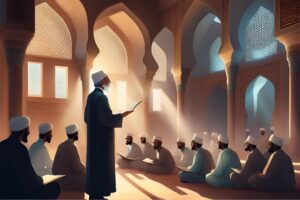The Role of Islamic Higher Education Institutions in the Development of Islamic Civilization

By Dr. Abdul Wadud Nafis, LC., MEI
Islamic higher education institutions are institutions that focus on teaching, research, and the development of Islamic sciences as well as other disciplines related to Islamic teachings and values. In this context, Islamic higher education institutions not only play a role in producing scholars, intellectuals, and Muslim leaders, but also in developing Islamic thought that is relevant to current global dynamics. Through a holistic approach, these institutions integrate religious knowledge with general science to address social, economic, political, and cultural challenges.
Islamic higher education institutions are educational institutions based on Islamic teachings with the goal of producing graduates who not only master religious knowledge but also have expertise in general sciences. These institutions serve as platforms to combine traditional Islamic thought with the development of modern knowledge, simultaneously fostering Islamic character and global competitiveness. Islamic higher education institutions are committed to preserving the intellectual heritage of Islam while responding to the challenges of modern civilization.
Islamic civilization refers to the social, cultural, political, economic, and intellectual developments influenced by Islamic teachings from the time of Prophet Muhammad (PBUH) until today. This civilization encompasses major achievements in various fields such as science, art, architecture, law, and philosophy that flourished during the Islamic caliphates and in different regions of the world. Islamic civilization has made significant contributions to global knowledge, especially during the golden age of Islam, when the Muslim world became a center of intellectual and cultural innovation. The principles of Islam, which emphasize justice, balance, and the pursuit of knowledge, are the main foundation of this civilization.
Islamic higher education institutions play a crucial role in maintaining and advancing Islamic civilization in the modern era. As intellectual hubs, these institutions produce Muslim generations capable of contributing to societal progress through a multidisciplinary approach. This role includes the development of knowledge, the preservation of Islamic traditions, the formation of future leaders, and the promotion of interfaith and intercultural dialogue. Thus, Islamic higher education institutions stand at the forefront of maintaining the existence and advancement of Islamic civilization amidst dynamic global changes.
Islamic higher education institutions hold an essential role in the intellectual, social, and spiritual development of Islamic civilization. The following are some key roles:
1. Centers for the Development of Islamic Knowledge: Islamic higher education institutions function as study centers that examine and develop various Islamic disciplines such as tafsir, hadith, fiqh, tasawuf, and other socio-religious sciences. This ensures that Islamic teachings remain relevant in addressing contemporary challenges.
2. Formation of Muslim Intellectuals: Through higher education, Muslim generations are educated to become intellectuals with broad insights, mastering not only religious knowledge but also general sciences. They are prepared to become leaders in various sectors, including religious, social, and economic fields.
3. Preservation of Islamic Traditions: Islamic higher education institutions play a role in preserving Islamic values and traditions, both through the curriculum taught and academic research conducted. In this way, the intellectual heritage of Islamic civilization remains intact and can be passed on to future generations.
4. Promoters of Intercultural Dialogue: Islamic higher education institutions serve as platforms for interfaith and intercultural dialogue, promoting peace and tolerance. This is important in maintaining harmony in increasingly pluralistic and global societies.
5. Development of Muslim Human Resources: Islamic higher education institutions prepare young Muslim generations to become agents of change in society, through both scholarly knowledge and social skills that can contribute to the development and advancement of Islamic civilization.
6. Strengthening Ethics and Morality: Education at Islamic higher education institutions also emphasizes the importance of good character and moral development, in accordance with Islamic teachings. This is crucial in shaping individuals capable of facing moral challenges in modern society.
Thus, Islamic higher education institutions not only play a role in educating and developing knowledge but also in shaping Muslim societies that contribute positively to world civilization as a whole.
With their strategic role, Islamic higher education institutions are key to building a strong and dynamic Islamic civilization. Through teaching, research, and community service, Islamic higher education institutions not only preserve the intellectual heritage of Islam but also ensure that its teachings remain relevant in the face of changing times. Here lies the strength of Islamic higher education institutions, as a bridge between tradition and innovation, which will continue to illuminate the journey of Islamic civilization towards a bright future.
References :
1. Abuddin Nata. Pemikiran Pendidikan Islam: Kajian Filosofis dan Kerangka Dasar Pengembangan Pendidikan Islam. Jakarta: Rajawali Pers, 2001.
2. Amin Abdullah. Studi Agama: Normativitas atau Historisitas? Yogyakarta: Pustaka Pelajar, 1996.
3. Harun Nasution. Islam Ditinjau dari Berbagai Aspeknya. Jakarta: UI Press, 1985.
4. Jalaluddin, & Said Amin. Filsafat Pendidikan Islam. Jakarta: RajaGrafindo Persada, 2007.
5. Mastuhu. Dinamika Sistem Pendidikan Pesantren: Suatu Kajian Tentang Unsur dan Nilai Sistem Pendidikan Pesantren. Jakarta: INIS, 1994.
6. Moeslim Abdurrahman. Paradigma Pendidikan Islam: Upaya Membongkar Kemapanan Tradisi. Bandung: Mizan, 2003.
7. Munir Mulkhan, Abdul. Paradigma Intelektual Muslim: Pengantar Filsafat Pendidikan Islam. Yogyakarta: Pustaka Pelajar, 2002.
8. Zainuddin, M. Perkembangan Pemikiran Islam. Jakarta: Prenada Media Group, 2008.


